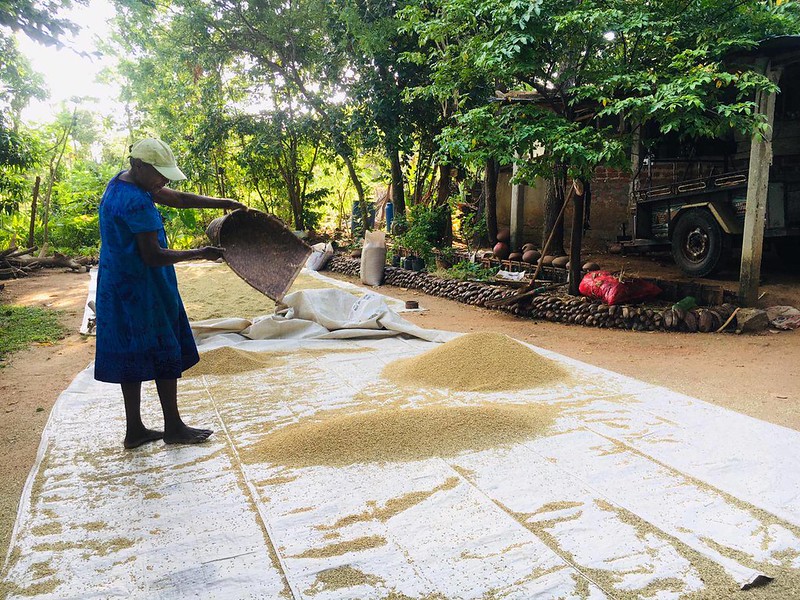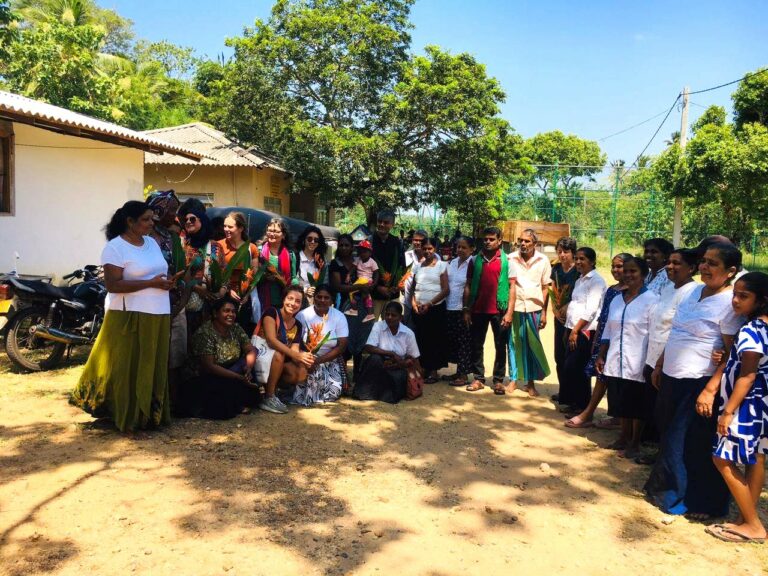By Isabel Alvarez Vispo, URGENCI’s President.
When you travel very far away, as far as Sri Lanka, you expect to find landscapes, people, cultures, in short, a part of the world that is very different from your everyday life. And indeed, you find them: temperatures and humidity you have never experienced before, a culture and smiles very different from ours, or a highly militarised country that shows us a daily life with codes and scenarios very different from ours. However, it is surprising (or perhaps not so surprising) how, when you look at places such as rural areas, the oppression they suffer and even the ways they cope with it, the distances are not so big. And that was the experience in Chandana Pokuna.
Chandana Pokuna is a village in the north of the country, near Lake Minneriya, with a landscape characterised by orchards and rice fields, where elephants, cows and monkeys coexist. The inhabitants of this village are mostly small farmers who are finding it increasingly difficult to survive due to market pressures, climate change and the country’s debt crisis, which has led the government to implement austerity policies that have cut off any support they might have received. In this context, they have been targeted by companies that come to their community offering a star solution: microfinance.
For decades now, microloans have been promoted as a way for the most vulnerable communities to access liquidity, especially for women, because we know that when we talk about micro, it is always aimed specifically at us. The theory is to provide small loans to enable investment and the development of initiatives. As we know, these theories can be good until the market and patriarchal capitalism (pardon the redundancy) take them over. In 2002, I heard a very experienced woman in India denounce microcredit as a way of extorting women from the most vulnerable communities in that country, and even how microcredit was used as a tool to control women’s bodies, demanding that in order to qualify for it, they agree to be sterilised. It is important to know all this because many of these initiatives are funded by European countries as part of their international cooperation policies and are sold as the way forward to empower women in their communities.
In the case of Sri Lanka, the formula involves companies coming to communities offering microcredit. To do this, the first thing they do is ask for the women leaders of the village to form a small group, whom they convince that their offer is the best way forward to solve their problems.
From there, they are instructed to spread the word: small loans, small instalments, everything easy. With this approach, thousands and thousands of women have fallen into the trap, because far from being the solution, the credit becomes a huge burden, with very high interest rates, which in this case has led to the suicide of more than 200 women, according to official figures, and to a large number of them having serious mental health problems. During our visit, we were told that there are no official figures on the number of people living under the extortion of microcredit because of the shame it brings to many families when they realise they have been trapped, but that there are thousands and thousands of them.
It is in this context that a group of women decided to start organising and rebelling against this extortion. In Chandana Pokuna, the women began to meet and look for ways to support themselves and give them some breathing space from the burden of being beneficiaries of these microloans. The first thing they decide to do is to start a collective payment strike because they believe they have been swindled. At the same time, they organise themselves and think together about ways to not only help themselves, but also to prevent others from falling into the same situation.
Based on this, they decided that they needed their own space that could provide them with liquidity, and they began to build a small community in which members must contribute 100 rupees per month and can also contribute part of their harvest. That harvest is sold collectively, and the profits are distributed among the women farmers and the collective to generate a fund. They also organise themselves to cook their produce for different events and thus earn extra income, which is again distributed among those who contribute produce and labour and the collective itself. In this way, a community-based, self-managed space is created in which, step by step, they are building a place where they feel free. There are still many, many problems, but it is a space where they have found mutual support. (As their motto says, slow and small).

In addition, they have added to their goal of freeing themselves from monetary oppression, the goal of improving their health and caring for the land by eliminating agrochemicals from their farms. The use of agrochemicals is a very important problem in the area, to the point that there is no drinking water due to the pollution caused by them. In this case, the group has begun experimenting on their farms with replacing inputs and incorporating more agroecological techniques. To do this, they organise small test fields on their farms where they cultivate using different techniques and inputs (humus, various preparations, super-compost and also chemicals). Each farm records both the inputs used and the harvest obtained in order to verify the differences. In short, this community is building a community-supported agroecological transition, as this collective not only includes farmers, but also other people who do not cultivate the land and make contributions to sustain it.
When you hear this story, in addition to being moved by these women, you realise that whether we are near or far, the answers to this heteropatriarchal capitalism that suffocates us all (although some more than others) necessarily involve building community spaces for support and also for self-defence.
Because this initiative is not just a cooperative space for obtaining finance, it is a safe space, a space that cares for and defends and sustains life in the face of a perverse system that only seeks to increase profits at the cost of creating dependencies that erode life and biodiversity. Thousands of kilometres from home, we have realised that the answer lies in moving forward together, starting small and going slowly, so that little by little we can go a long way.
©️ Photos by Nyeleni Global Forum.

